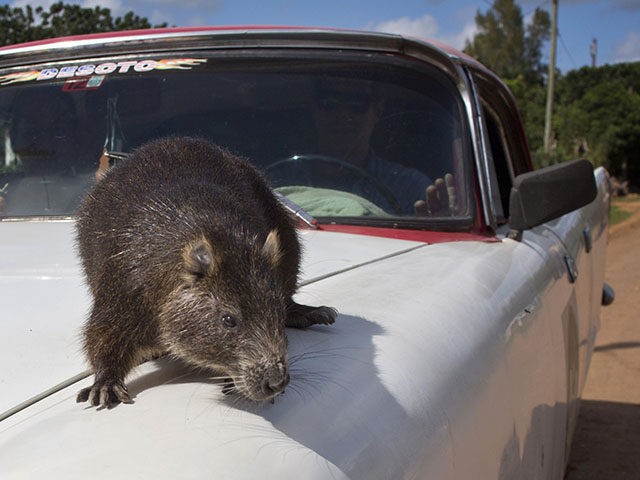Authorities in Cuba arrested an unspecified number of individuals in relation to the seizure of 700 pounds of meat taken from American crocodiles and jutías, a type of Caribbean rodent, the Cuban-American outlet Babalú Blog revealed on Sunday.
Cuban state television reported that those arrested had allegedly run afoul of environmental rules protecting the American crocodile, which environmental experts consider a vulnerable species. The jutía, a guinea pig-type creature, is not protected by Cuban environmental laws and, in light of extreme food shortages increasingly imposing stress on the nation’s food supply, government officials have promoted the rodent’s consumption.
Babalú, citing the Spanish-language outlet CiberCuba, noted that the individuals arrested were reportedly attempting to fish crocodiles out of local waters in Mayabeque, part of greater Havana. Cuban Communist Party authorities seized 384 pounds of crocodile meat and 315 pounds of jutía meat in what was reported as a “maritime” operation. Speaking to Cuban state television, coastal patrol officials reminded the public that an “absolute ban” existed on hunting American crocodiles, as the state protects the species. The report did not indicate any reason for the seizure of the jutía meat, though CiberCuba noted that the communist regime forces individuals to apply for special permits to hunt or fish nearly any animal. In some cases, the Party limits permits to hunt or fish animals because they are protected species, due to their population numbers. In others, however, the government maintains a monopoly on their extraction for commercial reasons; among these are luxury items like lobsters.
CiberCuba cited the Ministry of the Interior as stating that the confiscated meat was in “optimal conditions for human consumption,” eliminating concerns that the detained individuals were endangering the lives of any prospective clients, and that the “country’s fishing industry,” meaning government fishing officials, would determine its destination. The government, therefore, would probably sell the meat itself.
Food shortages have plagued the vast majority of Cuba for years, exempting members of the Castro family who regularly appear on social media attending lavish feasts with pro-communist celebrities. In early February, Cuban Prime Minister Manuel Marrero Cruz warned that the problem of food shortages for the general population was “a national security issue.” Marrero urged a reduction in imports and in the use of electricity, as power grid failures have also become increasingly common after over 60 years of minimal investments in infrastructure. Marrero is one of several lower-ranked officials who answer to the nation’s dictator, Raúl Castro, which also includes “president” Miguel Díaz-Canel, often erroneously identified abroad as the head of government.
Cuban state officials regularly blamed former President Donald Trump for any food shortages, claiming that sanctions on top officials were the cause of the government’s poor management of resources. Rather than attempting to produce solutions to the food shortages, communist regime officials have increased rationing of basic food items and promoted dubious sources of nutrition like banana peels. Amid growing protests over lack of basic food items in Cuban stores, Communist Party Commerce Minister Betsy Díaz Velázquez said on television in 2019 that the majority of Cubans enjoy food rations.
The jutía, the Caribbean rodent, was the star of its own culinary segment on Cuban television in December. State television hosts insisted its consumption was more “sustainable” than conventional meats and that its protein content was far higher than beef or pork.
“According to the experts, the average protein content [of guinea pig] is 19 percent, superior to porcine and bovine meat. Its consumption is a clear ally against anemia and malnutrition,” a Cuban state reporter claimed.
The conventional meats that are available to Cubans — chicken, pork, and beef — require ration card purchases often too expensive for the average person. At 140 pesos ($5.83) a pound, pork hit a record high price in January. For comparison, as of January, Cuba’s minimum wage is 2,100 pesos ($87.46) a month, or about 525 pesos a week. Other common items skyrocketing in pricing due to shortage are sweet potatoes, sugar, and rice.
Even with the money to buy meat, dissidents have revealed that some of what passes for food in Cuban stores is barely edible, including meat that has clearly not been properly refrigerated and is clearly rotting. The Patriotic Union of Cuba (UNPACU) published a video in 2019 showing meat that was clearly not suitable for consumption being distributed in ration centers. A witness told the dissident organization that she attempted to eat it but immediately suffered food poisoning.
“The neighbors told me that if I boiled it and threw away the water that I could consume it,” the woman said. “The next day, I boiled a piece, I cooked it, and I tried it. I ate a little piece with bread. And look at how I am now. Since yesterday, my stomach is upset, I am vomiting, I have diarrhea.”
Cuban state TV broadcast a dire report in May 2020 claiming that food shortages had prompted mass starvation in the United States.

COMMENTS
Please let us know if you're having issues with commenting.